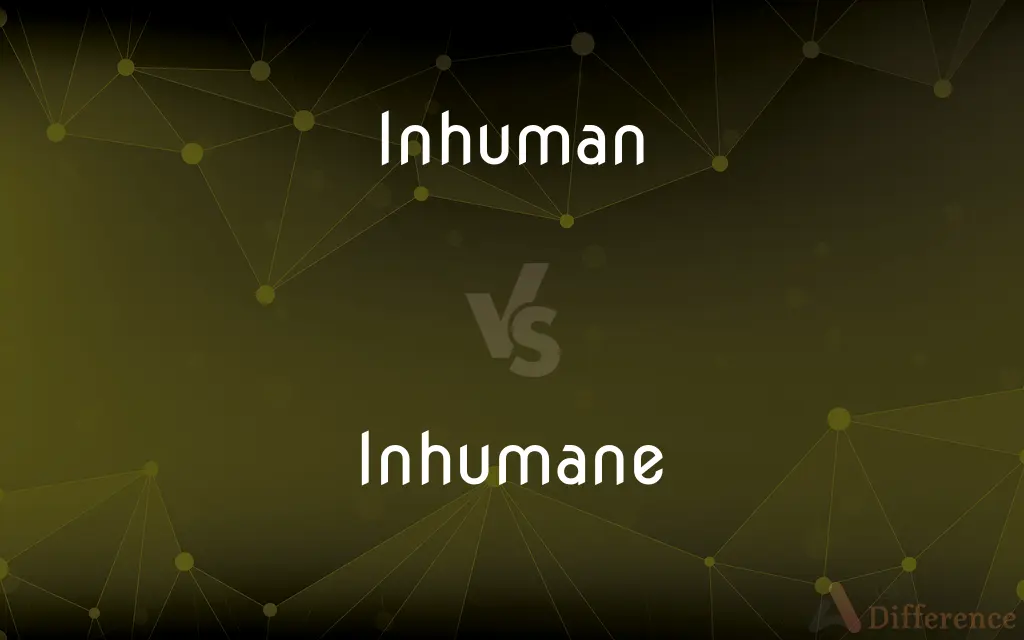Inhuman vs. Inhumane — What's the Difference?
By Maham Liaqat & Urooj Arif — Updated on April 1, 2024
Inhuman refers to a lack of human qualities or aspects, while inhumane denotes cruelty or lack of compassion.

Difference Between Inhuman and Inhumane
Table of Contents
ADVERTISEMENT
Key Differences
Inhuman describes something or someone lacking human qualities, characteristics, or emotions, often implying a departure from typical human behavior or appearance. For example, in science fiction, robots or aliens might be described as inhuman due to their lack of human traits. In contrast, inhumane refers specifically to actions or conditions that lack compassion, kindness, or decency towards humans or animals. It is commonly used to criticize practices or behaviors that cause suffering or are morally reprehensible.
While inhuman can describe beings or phenomena that are literally not human or lack human characteristics, inhumane actions are always perpetrated by humans but are considered morally wrong because they demonstrate a lack of empathy or kindness. The term "inhuman" might be used in discussions about artificial intelligence, emphasizing the absence of innate human qualities like empathy or intuition. Conversely, the term "inhumane" often appears in debates about animal rights or prison conditions, focusing on the moral implications of causing unnecessary suffering.
The distinction between inhuman and inhumane also reflects in their use in literature and law. Inhuman conditions or entities in literature often explore themes of alienation or the supernatural, while inhumane treatment in legal contexts usually refers to actions violating human rights or animal welfare standards. This difference underscores how each term evokes a separate aspect of human experience: one the absence of human likeness, the other a betrayal of human compassion.
Furthermore, public discourse uses "inhuman" to describe extreme or fantastical deviations from human norms, such as inhuman strength or capabilities. On the other hand, "inhumane" is frequently used to appeal to ethical considerations, highlighting actions or policies that should be condemned or reformed because they are cruel or unjust. This linguistic distinction emphasizes the ethical dimension inherent to the concept of inhumanity, contrasting with the more neutral or descriptive usage of "inhuman."
Comparison Chart
Definition
Lacking human qualities, characteristics, or emotions.
Showing a lack of compassion for humans or animals; cruel.
ADVERTISEMENT
Context of Use
Describes entities not human or lacking human traits.
Criticism of practices or behaviors causing suffering.
Moral Implication
Neutral, focusing on absence of human qualities.
Negative, indicating actions that are morally reprehensible.
Example Contexts
Sci-fi (aliens, robots), discussions about AI.
Debates about animal rights, prison conditions, welfare.
Associated Actions
Actions or traits devoid of human qualities, not necessarily morally judged.
Cruel or unjust actions, often involving harm or neglect.
Compare with Definitions
Inhuman
Lacking Human Qualities.
The alien's inhuman appearance frightened the children.
Inhumane
Cruel or Unkind.
The inhumane treatment of prisoners sparked international outrage.
Inhuman
Not Pertaining to Human Beings.
The landscape on the new planet was inhuman and stark.
Inhumane
Morally Reprehensible.
The inhumane act of violence was condemned by all.
Inhuman
Beyond Human Norms.
His inhuman strength was the stuff of legends.
Inhumane
Lacking Compassion.
Keeping pets in such inhumane conditions is unacceptable.
Inhuman
Devoid of Human Warmth or Compassion.
The voice on the phone was cold and inhuman.
Inhumane
Violating Rights or Welfare.
Such inhumane policies must be challenged and changed.
Inhuman
Supernatural or Otherworldly.
The inhuman speed of the creature was terrifying.
Inhumane
Causing Suffering.
The law was criticized for being inhumane to immigrants.
Inhuman
Lacking kindness, pity, or compassion; cruel or indifferent
Inhuman treatment of the prisoners.
Inhumane
Lacking pity or compassion.
Inhuman
Not suited for human needs
"The monks sat ... in inhuman quiet" (Maura O'Halloran).
Inhumane
Alternative form of inhuman: lacking pity or compassion for misery and suffering; cruel, unkind.
Inhuman
Not of ordinary human nature, form, or character
"The woman ... lets out a squeal, a strange pig-squeal, completely inhuman" (Ashley Warlick).
Inhumane
Not humane; lacking and reflecting lack of pity, kindness, or compassion; as, humans are innately inhumane; this explains much of the misery and suffering in the world; biological weapons are considered too inhumane to be used.
Inhuman
Of or pertaining to inhumanity and the indifferently cruel, sadistic or barbaric behavior it brings.
Inhumane
Lacking and reflecting lack of pity or compassion;
Humans are innately inhumane; this explains much of the misery and suffering in the world
Biological weapons are considered too inhumane to be used
Inhuman
Transcending or different than what is human.
Inhuman
Destitute of the kindness and tenderness that belong to a human being; cruel; barbarous; savage; unfeeling; as, an inhuman person or people.
Inhuman
Characterized by, or attended with, cruelty; as, an inhuman act or punishment.
Inhuman
Without compunction or human feeling;
In cold blood
Cold-blooded killing
Insensate destruction
Inhuman
Belonging to or resembling something nonhuman;
Something dark and inhuman in form
A babel of inhuman noises
Common Curiosities
Is inhuman always negative?
No, "inhuman" can be neutral, focusing on the absence of human qualities without a moral judgment.
Why is inhumane considered negative?
Inhumane is negative because it implies a lack of compassion or cruelty, which are morally condemned behaviors.
How do laws address inhumane practices?
Laws aim to prevent inhumane practices through regulations and penalties, especially in healthcare, animal welfare, and corrections.
What defines something as inhuman?
Inhuman refers to lacking human qualities or characteristics, often used to describe things not human or beyond human norms.
What is an example of an inhuman ability?
An inhuman ability could be something like possessing superhuman strength or speed.
Can animals be described as inhumane?
No, "inhumane" refers to human actions that are cruel; animals cannot be inhumane since the term implies a moral choice.
How do cultures view inhuman characteristics?
Cultural interpretations vary, but often inhuman characteristics are seen with awe, fear, or as supernatural.
What is the significance of recognizing inhumane actions?
Recognizing inhumane actions is crucial for ethical awareness and promoting a more compassionate society.
Can a person be inhumane?
Yes, a person can be inhumane if their actions are cruel, lacking in compassion, or morally reprehensible towards others.
Can inhuman and inhumane be used interchangeably?
No, they have distinct meanings: inhuman refers to the absence of human qualities, while inhumane denotes cruelty or lack of compassion.
Is technology ever described as inhuman?
Yes, technology can be described as inhuman when it lacks human warmth or seems too mechanical.
Are inhumane actions always illegal?
Not always, but inhumane actions can violate laws, especially those concerning human rights or animal welfare.
How can inhuman traits be positive?
Inhuman traits, like exceptional abilities or resilience, can be seen positively when they contribute to achievements or survival.
What are the consequences of inhumane treatment?
Inhumane treatment can lead to suffering, psychological trauma, and sometimes legal actions against the perpetrators.
Can a society be inhumane?
A society can be considered inhumane if it upholds practices or norms that cause suffering or injustice.
Share Your Discovery

Previous Comparison
Zerbert vs. Raspberry
Next Comparison
Seal vs. SillAuthor Spotlight
Written by
Maham LiaqatCo-written by
Urooj ArifUrooj is a skilled content writer at Ask Difference, known for her exceptional ability to simplify complex topics into engaging and informative content. With a passion for research and a flair for clear, concise writing, she consistently delivers articles that resonate with our diverse audience.














































